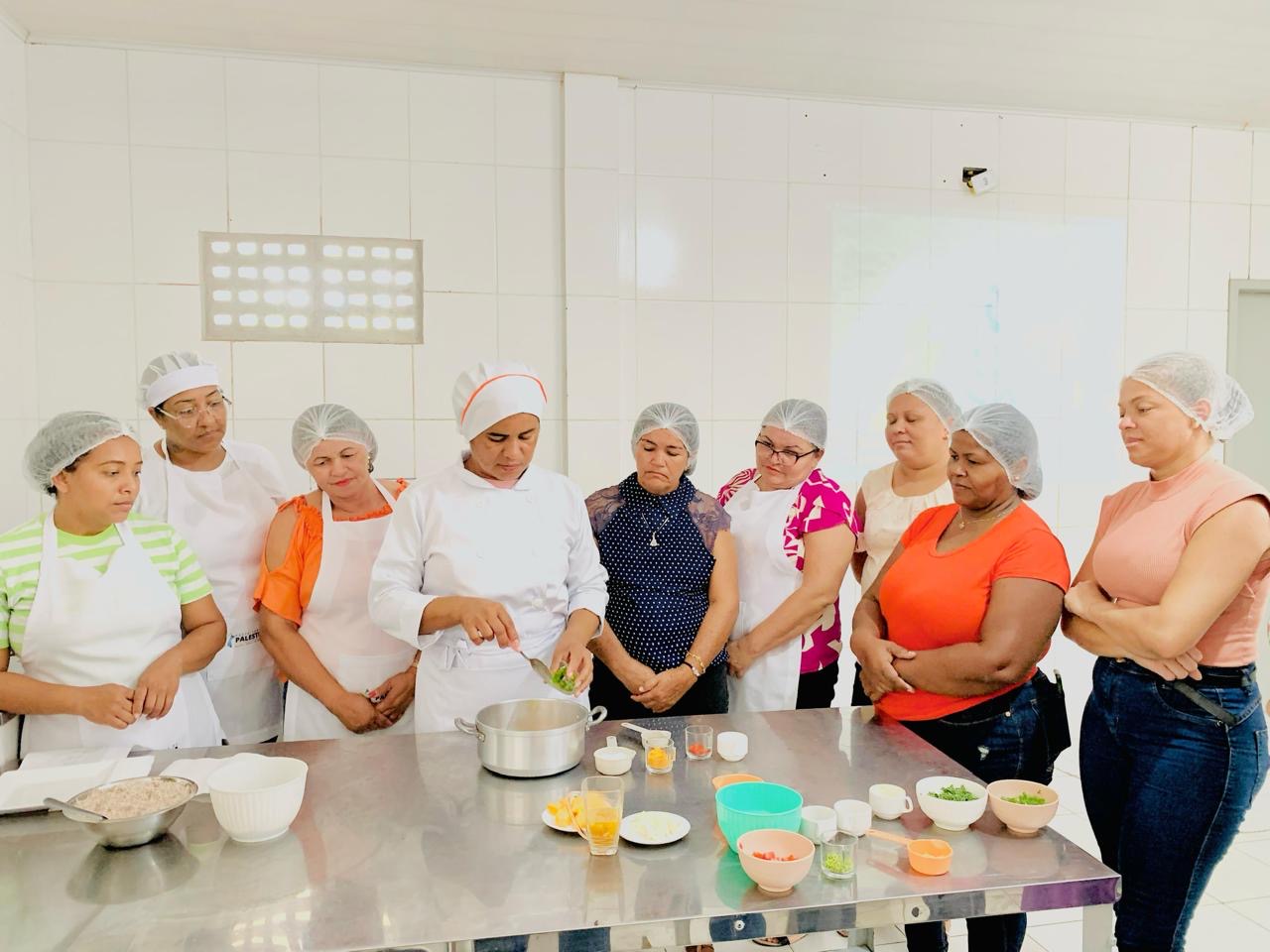
A rich exchange of experiences on food, health and culture was the theme of the meeting that brought together thirty-one school cooks and two nutritionists from the city of Palestina (AL) with Josefa Graciene Ribeiro, Graci, a school cook from Limoeiro de Anadia (AL), who won the reality TV show Vida de Merendeira in 2024.
Called the School Nutrition Exchange, the meeting, held on 2 May, allowed the cooks to exchange experiences and was an opportunity to learn behind-the-scenes stories from the reality show.
The reality show Vida de Merendeira is an initiative of the National School Development Fund (FNDE) in partnership with the World Food Programme (WFP) Centre of Excellence against Hunger in Brazil, with the support of the Brazilian Cooperation Agency (ABC), and aims to value and give visibility to the work of school cooks.
Graci’s work as a school cook began in 2021. Since then, she started her university degree in pedagogy, won the reality show and began studying gastronomy. Today, she is the supervisor of the Limoeiro Anadia municipality’s school cooks and serves all the schools.
In the following interview, Graci tells us a little about her career, how the reality show changed her life and the importance of recognising the profession of school cook.
Could you tell us a bit about your story?
I’m 38 years old. I’m from Limoeiro, I was born and raised here. I’m married and my son Lucas is 20. My husband and I worked together in the fields planting manioc. I even took a cake course to sell. But when the school opportunity came up, I went.
What was your job like as a school cook?
We divided up the tasks. For example, when it’s chicken day, one of us does the building, another puts the spices on, cuts the vegetables, and another does the preparation over the fire.
How many children eat at school?
Between 250 and 300, in the morning, afternoon and evening, when there are Youth and Adult Education students. For macaroni, we make 25 packets of pasta; to make couscous, it takes 15 packets of cornmeal.
Is there training for school cooks?
Yes, with the nutritionist and some teams from Sebrae and Senai. We’ve learnt a lot to avoid waste and to vary the preparation. For example, when the banana is overripe, some of it is frozen and some is used to make cake. The cassava, instead of just serving it one way, we make chicken pie. The pumpkin, you can use the peel and the seeds.
What’s your relationship like with the school nutritionist?
She prepares the menu, but she also asks for our opinion. When there’s a food on the menu that the students don’t eat much of, we make suggestions and the nutritionist tries to adapt the dish.
How did you come up with the winning recipe, Chicken Chess?
Janaína [the nutritionist], who always encouraged me, told me to test the recipe. Her only suggestion was for me to add licuri farofa, a coconut that is very common in the region.
What was the biggest impact of the reality show in your life?
It was a marvellous experience. And being able to travel to São Tomé and Príncipe [to take part in the meeting of the Community of Portuguese-Speaking Countries], and get to know a reality that is totally different from ours, was a lifetime experience.
What was the journey like?
When we arrived, the cookers there were making a huge pot of food on the wood-burning cooker, which they had cracked themselves. Some pupils bring pots from home because the school doesn’t have enough plates and mugs for everyone. It’s simple there, but everything is clean and organised, and the children are welcoming. They use a lot of bananas and breadfruit in their dishes, which are eaten in different ways. The experience we had with them was incredible.
What is your dream?
I’m studying pedagogy and gastronomy. I plan to finish both next year.
What do you think of Vida de Merendeira?
It was an opportunity for the cooks to showcase their work. The cooks cook as if they were making food for their child, because everyone at school becomes a child in their heart, and they are happy when the child eats well. Often, the child has no food at home and goes to school without eating. And often their main meal is at school. The Show helps people understand this reality and to value the school cook.




